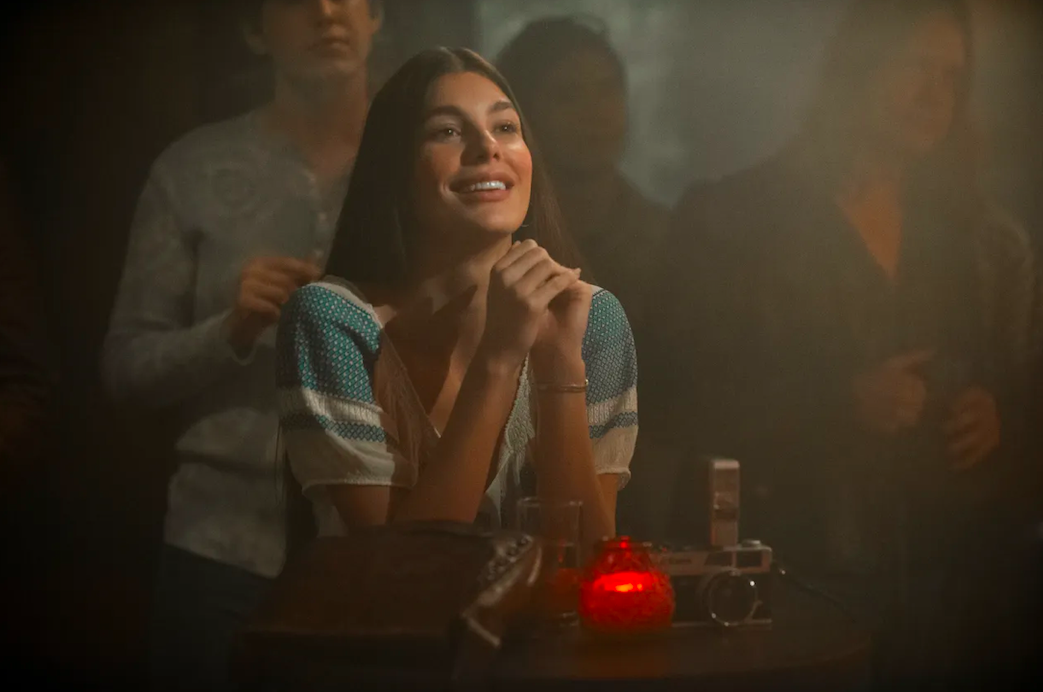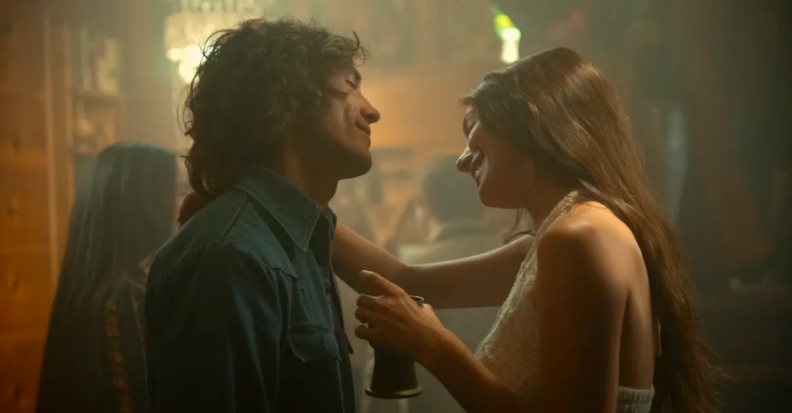Lessons from Camila Dunne: The Strength in Staying
I have no qualms about asking for what I want. I count myself lucky to have been listened to enough times in my youth that I learned I could speak up. I can voice my needs or kick someone out of my room if I decide I no longer want them there. I have even mastered that most valuable skill of breaking my own heart by knowing what I deserve and how to leave if I’m not fulfilled. I thought I had the meaning of strength figured out every time I closed a door.
As usual, life isn’t so simple. People proved complicated (duh). Leaving came easily to me, so what I had to learn was the opposite.
Enter Daisy Jones and the Six (more accurately, Camila Dunne)
Camila Dunne, Prime Video
When I read Daisy Jones and the Six, Camila Dunne struck me as the beating heart of this story. I saw her faith in her husband, Billy, as something I could never share. I would’ve left.
But Camila is a force of nature. Her strength radiates in every scene: as a single parent, a stabilizing force for band members, and an expert at getting her way without anyone realizing how she did it. One of my favourite examples from the novel was the brunch scene when Camila asked for pancakes, but the rest of the group wanted burgers; a couple hours later, by her subtle manoeuvring, everyone was happily eating pancakes, with no burger in sight.
I loved the example of strength that Camila exemplified, which became a prevalent theme in my book club discussions. We examined the question of faith, which is so often accompanied by the prefix “blind”. That is how I’d pictured faith in my mind: a submission to the will of the gods. But Camila’s faith pays off. In the book, Billy never relapses. He is a loyal husband and father to their children. He gives Camila the life she deserves. As Karen observed, Camila always gets what she wants—and that is certainly no act of god. She herself willed it into existence. As Billy reiterates throughout the story, Camila’s faith in him is what saves him. He wants to be the man that she believes him to be. It is the photo of his girls that keeps him from the drink at the end.
Camila’s power is that she believes the best in everyone, and as a result, she brings it out. That is an incredibly difficult thing to do, especially when you’ve already been hurt by the worst in people. As Camila herself admits, she had no guarantees in choosing to stick beside Billy (hence, faith), but her trust in him is active. It motivates and spurs action. It is recursive. It allows him to heal, and consequently, they get to enjoy their happily ever after. In the same vein, Camila’s faith and compassion in speaking to Daisy in Chicago allows the latter to leave and seek the help she deserves.
The Adaptation
Camila and Billy with their baby daughter Julia, Prime Video
While the television series gets many things right, the shift in Camila’s character and her and Billy’s relationship stand out. Camila is not entirely reduced to the jealous wife, but significant changes to that effect are made, resulting in her leaving Billy by the end and him relapsing before entering rehab to “win her back”.
I am not necessarily upset by these changes; rather, I am interested in what these artistic choices say about our priorities and values as a society. Instead of including the brunch scene, Camila’s strength is shown in different ways: through her independence and eventually, through leaving. She is given “a secret of [her] own” with the implication that she sleeps with band member Eddie. In the show, she calls Billy out for his proximity to Daisy, gives him an ultimatum (“if you love her, that is where this ends”), tells Daisy that she and Billy deserve each other, and walks out.
This is very different from the Camila in the novel, who remains self-assured throughout the whole story. At the birth of their daughter, she is the one who tells Billy to either meet Julia or go to rehab (this line is given to Teddy in the show). She offers Daisy genuine help in the climactic scene, and calmly states, “Daisy, he loves you. You know that he loves you. I know that he loves you. But he’s not going to leave me.” Camila is never threatened by Daisy, and in that conversation, Daisy describes Camila as being “so in control.” She commands the room with unshakeable faith in what she knows, somehow managing to kick Daisy out of her life at the same time as providing the earnest support that Daisy needs to get better. In the years that followed, Daisy remains grateful to Camila, who she respects unwaveringly.
Highlighting these differences is not to demonstrate that one reaction is more valid than another. I think in difficult moments, we react with all the grace we have within us, which is sometimes not very much. I have erred on the side of screaming far more than the opposite. However, it meant a lot to me to have Camila’s definition of strength depicted in the novel as a model to look up to. I aspired to be more like her: someone kind and forceful all at once. Someone who had the strength to keep faith and not lash out when it was clear people needed help rather than anger. Instead, the show delivered us the same conventional version of control: getting upset and leaving.
So What?
Billy and Camila, Prime Video
Why does this matter? Firstly, because the ability to leave is so often gendered male, and I am wary of the kind of feminism that teaches girls to emulate boys without advocating for the reverse. Men leave their sick wives at six times the rate they are left. What happens if we just teach people to leave whenever things get hard?
I come from a communal culture, one that is still shocked by the west’s practice of putting the elderly in care homes and leaving them when they are no longer self-sufficient. Too often, I have heard the phrase, “you don’t owe anyone anything,” which is simply false. We do owe people things, and we cannot build any kind of community or resistance without owing. Similarly, relationship takes such as “if they wanted to, they would” (which one relationship therapist on TikTok thoroughly debunks) create narratives that dismiss trauma, lived experience, and growing through our imperfections.
What we should be teaching is how to determine the boundaries of when to leave and when to stay. How do you tell when someone is worth sticking around for? How do you know what a good relationship feels like? How do you offer kindness and advocate for your needs while not dehumanizing the person in front of you? Camila is described as the most observant character in this story—the opposite of blind. She had faith, because she saw Billy for who he was; one of my favourite examples of this in the book is when Billy speaks of quitting the band, and Camila reminds him that she married a rockstar. She knows what that means and does not want him to be someone else; despite missing the birth of their first child, he is someone worth loving for exactly who he is.
I write this with the knowledge that we’ve all made mistakes, said things we regret, and try and try again to do better for the ones who stay. I hope that I’m deserving of that grace in return, and that the people who truly love me will continue to love me through not only my best but also my worst.



